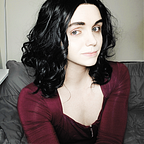Maybe You Don’t Have to Be Likable
I wish I’d figured it out sooner.
I remember my first attempt at small talk.
I walked up to my kindergarten teacher and asked her what she was doing. She said, “What does it look like I’m doing?”
Wow. Okay.
I decided to leave her alone.
For days, I tried to figure out what I’d done wrong. People asked each other stupid questions all the time. That’s how they started conversations. For me, apparently it didn’t work. People didn’t think I was trying to start a conversation. They just assumed I was stupid.
For most of my life, I tried hard to be likable. I followed the rules, at least as my strange brain understood them. Twenty years later, I was still having the same kinds of interactions.
I couldn’t even get compliments right. If I tried to say something nice to someone, it made them feel awkward.
School was torture.
Most of the time, I couldn’t tell the difference between teasing and bullying. Hugs confused me. If a guy asked me out, I couldn’t decide if he was serous or just kidding.
One time at a party, a girl smiled and flipped me off. I thought it was a new joke. I didn’t grasp she was being mean.
